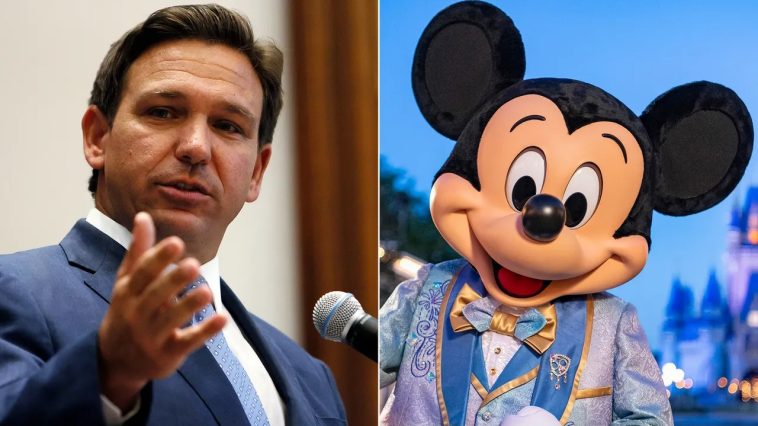LISTEN HERE:
In the most recent update to a widely discussed lawsuit, U.S. Federal Judge Allen Winsor gave a resounding ruling last Wednesday. The case pitted the Florida Governor, Ron DeSantis, against media giant Walt Disney Company. Disney had argued that they experienced unfair retribution from the state of Florida due to their opposition to a particular legislation targeted at education. However, Winsor formally dropped the lawsuit, declaring that Disney did not present robust jurisdictional grounds for the complaint.
Disney’s accusations against DeSantis, as well as the Central Florida Tourism Oversight district board, stemmed from what they perceived as an infringement on their right to free speech. Nevertheless, the judge’s decision was influenced by legal precedents which demonstrated that Disney’s claims did not align with established interpretations of freedom of speech laws.
Winsor’s decision was emphatic. ‘Disney lacks standing to sue the Governor or the Secretary,’ he announced, grounding his judgment in an understanding of the Constitution as it pertains to the delineation of authority and powers. It was a notable ruling in a highly publicized case, with implications that could ripple throughout the corporate world and their political engagements.
Winsor further noted that a constitutionally valid statute could not be the basis for claims of free speech infringements. The judge stated, ‘When a statute is facially constitutional, a plaintiff cannot bring a free-speech challenge by asserting that the lawmakers who passed it acted with a wrong intention.’ This statement underlined the complexity and subtlety of constitutionally grounded arguments.
The disagreement between DeSantis and Disney kicked off at the start of 2022, embodying a dynamic national debate. Disney decided to go on record against the Parental Rights in Education Act, a bill that intended to set boundaries around what could be discussed in terms of sexual orientation and gender identity with children from kindergarten to the third grade.
Reacting to Disney’s charge into politics, the Florida legislature made a bold move. They revoked the media behemoth’s special development district, a title that spanned the entirety of Walt Disney World in the sunshine-clad state of Florida.
Disney’s brush with legal politics is worth noting as it comes amidst a national conversation on the intersection of education, youth, and sensitive social subjects. Their stance not only highlights the corporate giant’s political awareness but also speaks to a broader question of how business interests engage with state law and politics.
The implications of this lawsuit extend beyond an isolated incident. It sets the stage for potential future legal proceedings involving corporations and governmental bodies. It is a factor that may be considered by companies in how they enter, or choose to avoid, distinct political controversies.
The case also bears significance in mapping out the limits of free speech claims vis-a-vis governmental actions. The complicated relationship between constitutionality, legislative intent, and freedom of speech rights is once more at the forefront of legal dialogue and analysis. Whether it signifies a precedent or a singular instance remains to be seen.
Disney’s loss in court is unlikely to dampen the spirits of stakeholders in matters of public education policy. Legitimate challenges to laws and policies continue to emerge as societal perspectives evolve, often leading to shifts in acceptance and understanding. The Parental Rights in Education Act is no different, garnering both extensive support and stern opposition.
While this story has taken a definitive turn with the judicial ruling, it undoubtedly points to a broader and ongoing situation. Cases like these, involving corporate behemoths and government officials, signal complex changes in the dynamics governing business and politics in America.
The ruling, while conclusive with regard to the legality of the complaint, does not completely close the narrative. Disney, like many other corporations, continues to have its political pulse tuned in, and it is likely the intersection of politics and business will see more high-profile exchanges.
In conclusion, the outcome of the lawsuit provides a cautionary tale for entities considering legal recourse. Though the freedom of speech argument was laudably deployed, its use did not withstand judicial scrutiny this time around. As corporate entities and governmental bodies continue to navigate this relationship, the discussion on the intersectionality of politics, governance, and corporations will only deepen.
More Articles: Real News Now



